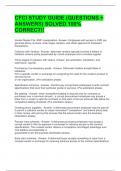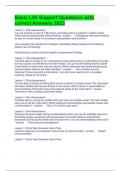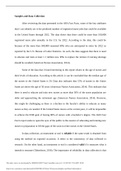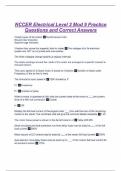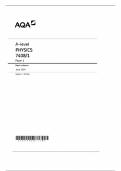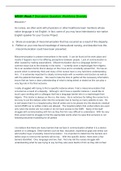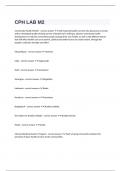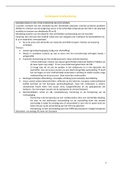ANSWERS) SOLVED 100%
CORRECT!!
Vendor Master File (VMF) manipulation -Answer- Employees with access to VMF can
generate phony invoices, enter bogus vendors, and obtain approval of fraudulent
transactions.
Collusion with Vendors -Answer- dishonest vendors typically involves a bribery or
kickback scheme jointly perpetrated by a bank employee and a crooked supplier.
Three-stages of collusion with vedors -Answer- pre-solicitation, solicitation, and
submission. (pg 62)
Purchasing of unnecessary goods. -Answer- Dishonest insiders accept bribes or
kickbacks
from a specific vendor in exchange for recognizing the need for the vendor's product or
services by his
or her organization. (Pre-solicitation phase)
Specification schemes. -Answer- Vendors pay corrupt bank employees to write contract
specifications that favor their particular goods or services. (Pre-solicitation phase)
Bid splitting. -Answer- when competitive bidding is required only for contracts or
purchases over a minimum amount., a corrupt procurement employee may accept a
bribe from a vendor to split the contracts so that each of the two amounts falls below the
competitive bidding threshold. (Pre-solicitation phase)
Creating phony suppliers. -Answer- a dishonest procurement employee may be paid off
to permit a collusive vendor to create nonexistent "competitors" and submit phony bids
in their names, with pricing that ensures that the actual vendor wins the business.
(Solicitation phase).
Pay-per-view schemes. -Answer- A dishonest purchasing employee may accept a
corrupt vendor's offer for payment in exchange for advance access to the contract
specifications. The crooked vendor obtains a competitive (and illegal) advantage over
rival bidders and essentially is
guaranteed to win the business.(Solicitation phase).
Early-start schemes. -Answer- A dishonest buyer accepts something of value from a
crooked vendor in exchange for receiving advance access to the contract specifications.
, The preferred vendor gains extra time to prepare its bid, thereby putting the competition
at a disadvantage. (Solicitation phase)
Submission Phase -Answer- providing a preferred (i.e.,bribe-paying) vendor with the
details of already-submitted bids, in order to give the corrupt vendor a leg up in tailoring
a bid in a way that ensures he or she will win the business.
Bid pooling. -Answer- A process by which several bidders conspire to split contracts,
thereby ensuring that each gets a certain amount of work, which does not require
collusion with an insider (Submission phase).
Travel and Entertainment fraud (T&E) -Answer- Employees using traveling and
entertainment expenses as a way to defraud the company.
Making multiple reimbursement claim submissions. -Answer- When two or more
employees dine together
while on the road, each may submit a forged claim for reimbursement for his or her own
meal even
though a single member of the group paid the entire bill. Similar practices often occur
with shared
taxis, airport shuttle services, and other expenses. (T&E Fraud)
Falsifying receipts. -Answer- Receipts for transportation, hotel, restaurant, and other
business travel expenses are easily obtained and "recycled" by employees either by
forgery or by alteration. It is all too easy, for example, to alter the date or amount on a
receipt before it is submitted. (T&E Fraud).
Claiming expenses just below the minimum documentation requirement. -Answer- If
receipts are required for all expenses over $25 for meals, an employee may fraudulently
submit undocumented claims for amounts of $24.99 or $24.95. (T&E Fraud)
Claiming for "out-of-policy" expenses. -Answer- A dishonest employee may test your
organization's anti-fraud controls by submitting a receipt for a personal expense
incurred during a business trip. If the form is complicated the processor may just
approve payment (T&E Fraud)
Purchasing Card Fraud (P-Card) -Answer- Corporate card used by legitimate holders
who charge non-business expenses to the employer and falsely document them as
legitimate job-related purchases. (pg 64)
Automated Clearing House (ACH) -Answer- An electronic network for financial
transactions in the U.S. The network processes batches of debits and credits to various
financial institutions allowing for fast, safe and efficient transfer of funds.
Forged Check -Answer- a check signed by someone else other than who is specified on
the check without that person's permission

